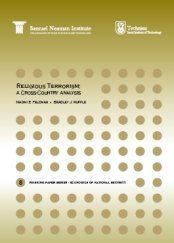ספרות תיאורטית ההולכת וגדלה מסבירה מדוע ארגונים דתיים ערוכים טוב יותר לתכנן פיגועי התאבדות בפרט ופעולות טרור בכלל, מאשר מתחריהם הלא-דתיים. אנו מציעים את המבחן המקיף הראשון הבוחן את תפקידי הדת והאידיאולוגיה הדתית בטרור תוך שימוש במסד נתונים של מדינה ברמה ייחודית בנושא של טרור פנים. התוצאות של מחקרנו מראים שקבוצות טרור דתיות למעשה מוציאות אל הפועל פחות פעולות מהממוצע מאשר קבוצות בעלות אידיאולוגיות אחרות (כגון: לאומנים וקומוניסטים). עם זאת, בהתאמה לספרות התיאורטית (לדוגמה: ברמן ולייטין, 2008) קבוצות דתיות טוענות שהן משיגות רמת קרבנות לא פחותה מאשר קבוצות שאינן מונעות מטעמי דת הנוקטות בכל הטקטיקות של פעולות טרור ולא רק בפיגועי התאבדות, כפי שנהוג לחשוב.
כתמיכה לגישתו התורמת של אדם סמית’ על התחרות הבין דתית, מצאנו שישנו קשר ישיר בין המגוון הדתי הרחב לבין טרור במיוחד טרור על רקע דתי. יתר על כן, תוצאות מחקרנו מגלות שקבוצות טרור לאומניות וקומוניסטיות מבצעות מספר רב יותר של פעולות טרור ככל שמספר קבוצות הטרור בארצותיהם גדל, בעוד שקבוצות טרור דתיות אינן תלויות במספר קבוצות הטרור. אנו משערים שהבדל זה נובע מההרג הנרחב שנגרם ע”י טרור דתי. קבוצות של טרור דתי מתנהגות כמנהיגות שוק, כאשר קבוצות טרור לא דתיות ושאינן יעילות פועלות כממשיכות דרך בתגובה ללחץ תחרותי.
 / דוחות ומחקרים / טרור דתי : אנליזה חובקת עולם
/ דוחות ומחקרים / טרור דתי : אנליזה חובקת עולם











